Unit 3 Will people have robots?(Section A 1a-2d)课件
文档属性
| 名称 | Unit 3 Will people have robots?(Section A 1a-2d)课件 | 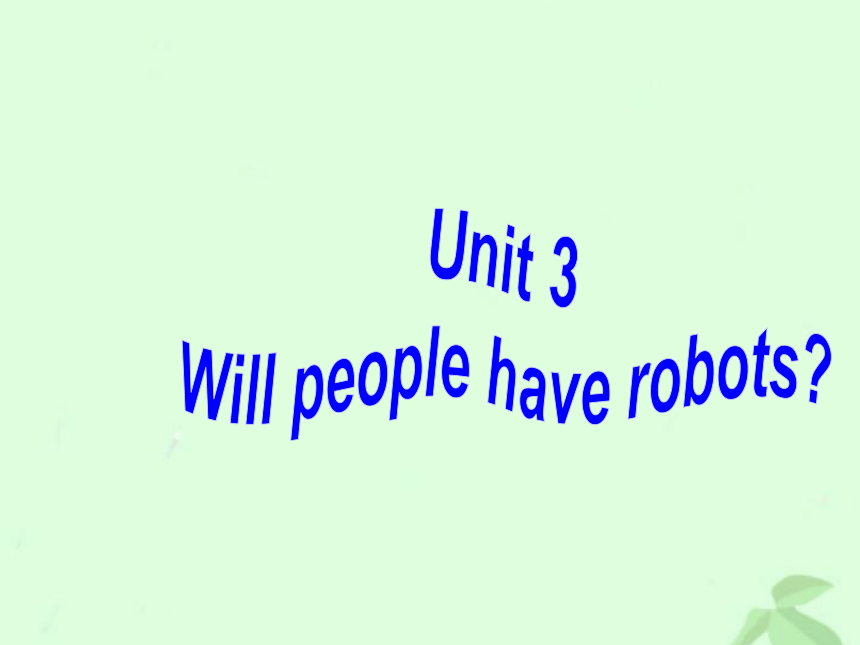 | |
| 格式 | zip | ||
| 文件大小 | 1.1MB | ||
| 资源类型 | 教案 | ||
| 版本资源 | 鲁教版 | ||
| 科目 | 英语 | ||
| 更新时间 | 2016-01-17 21:59:14 | ||
图片预览

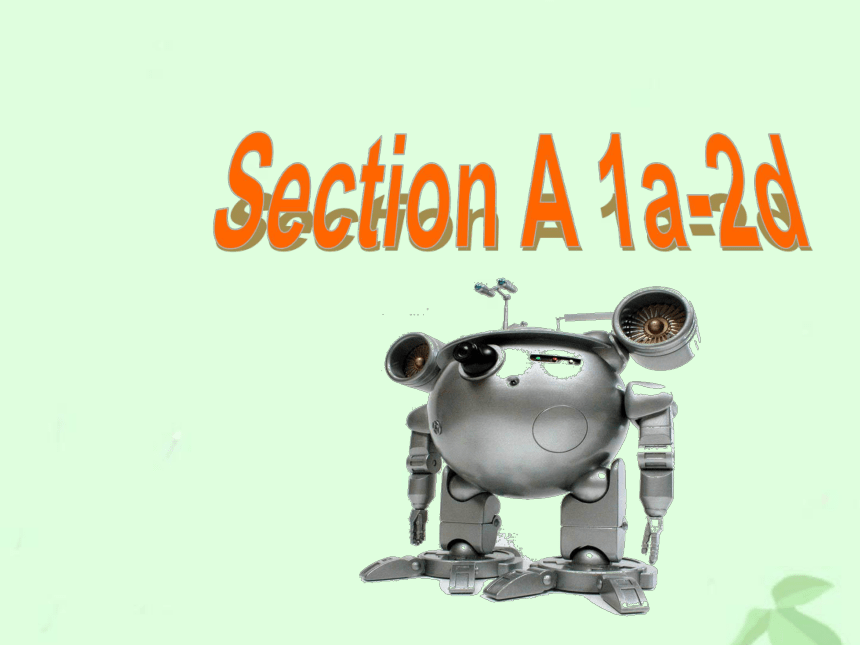
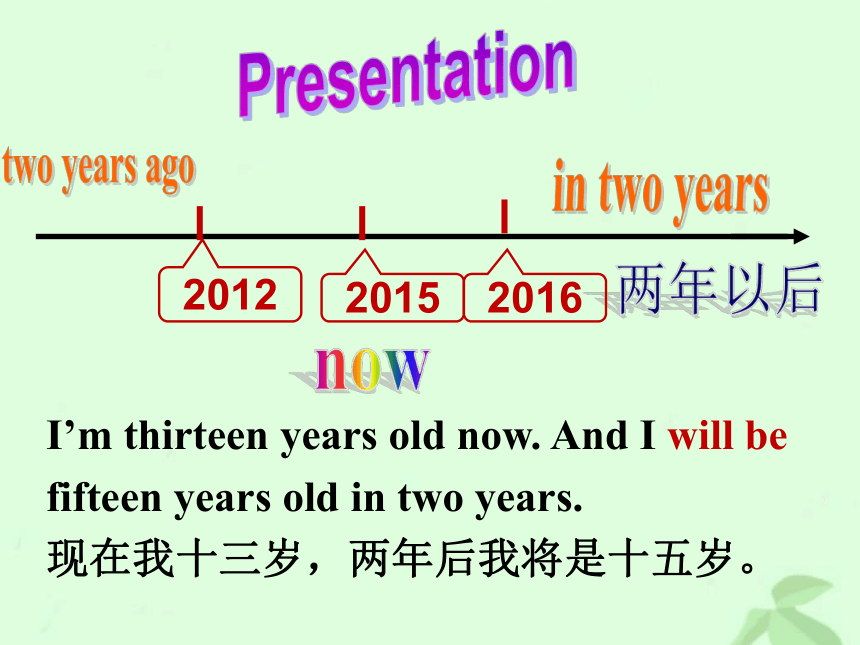
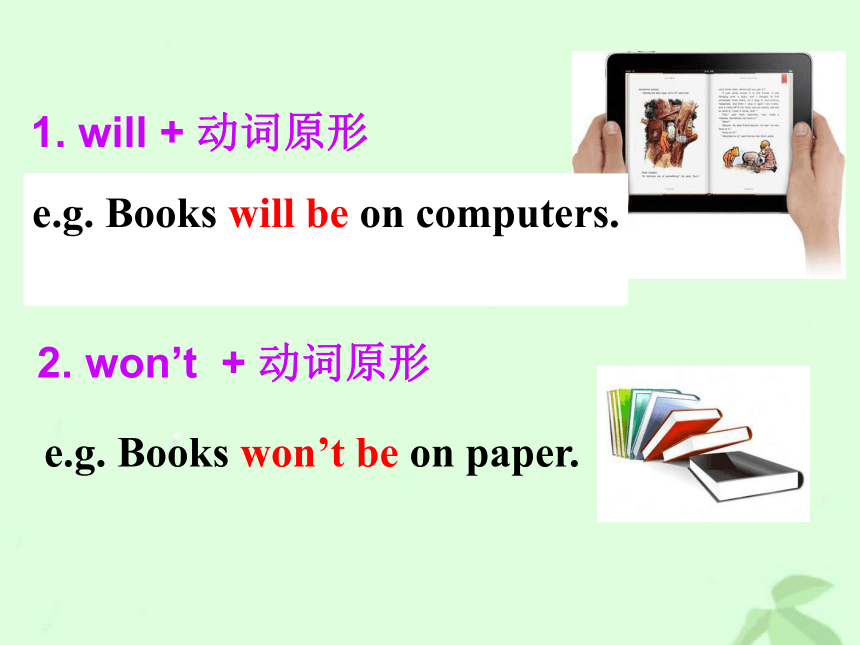
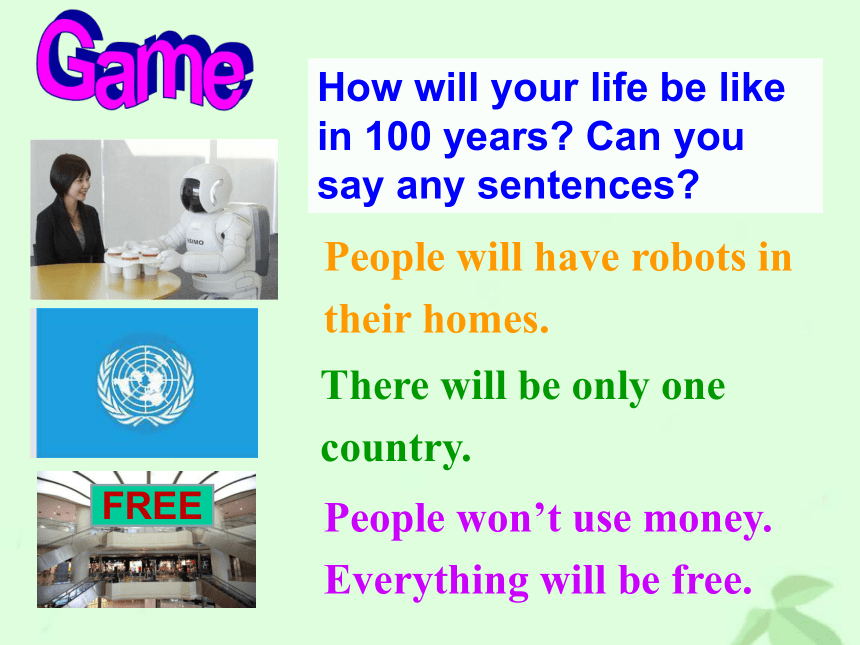
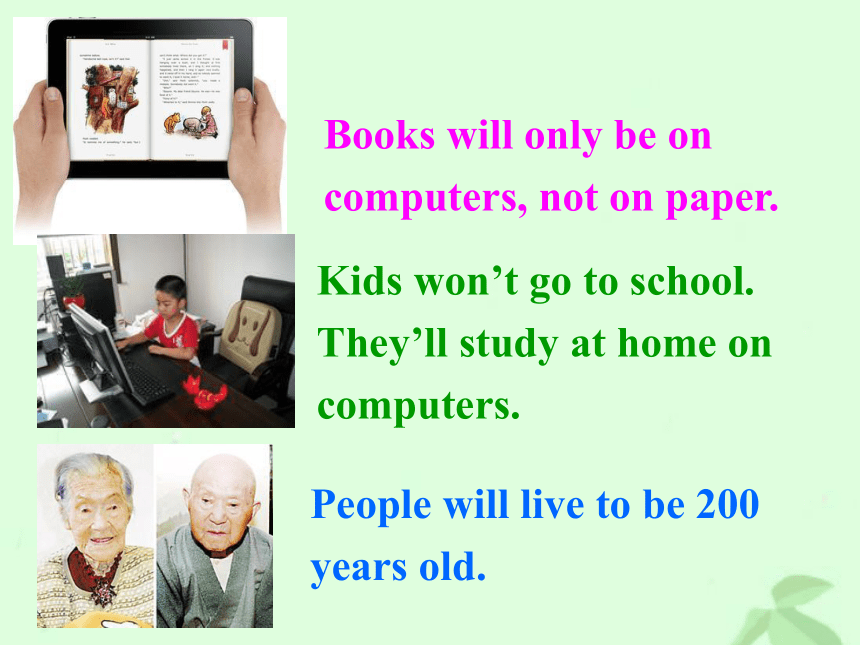
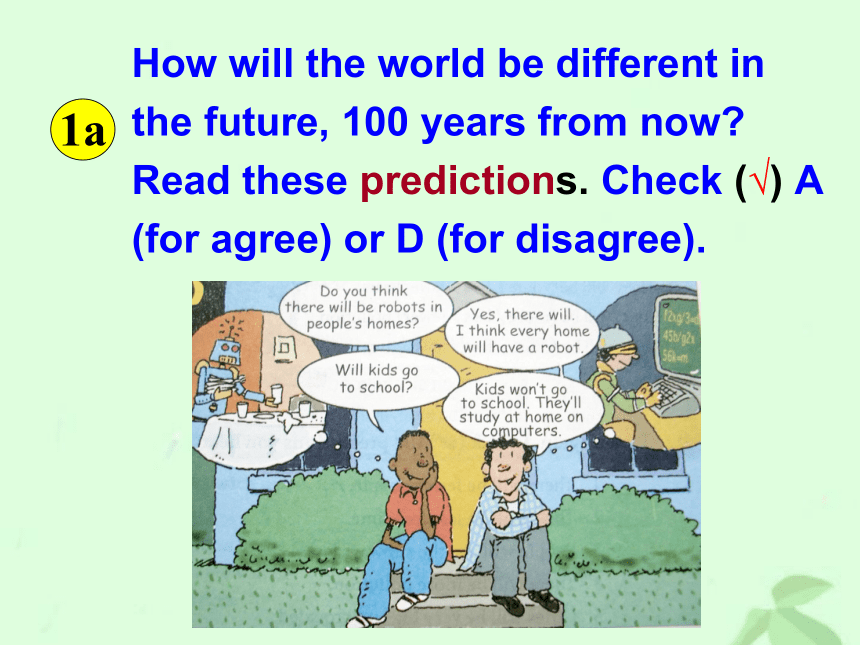
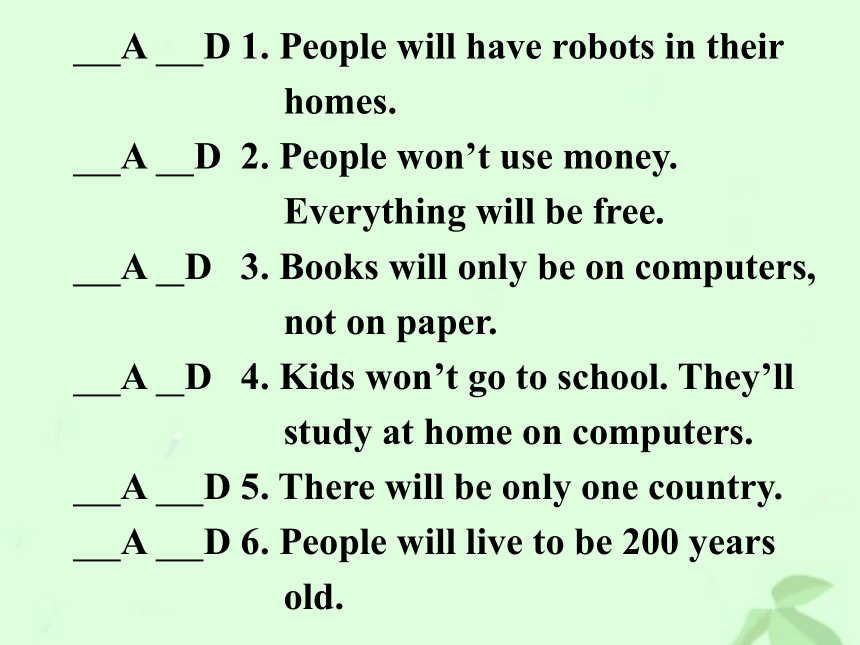
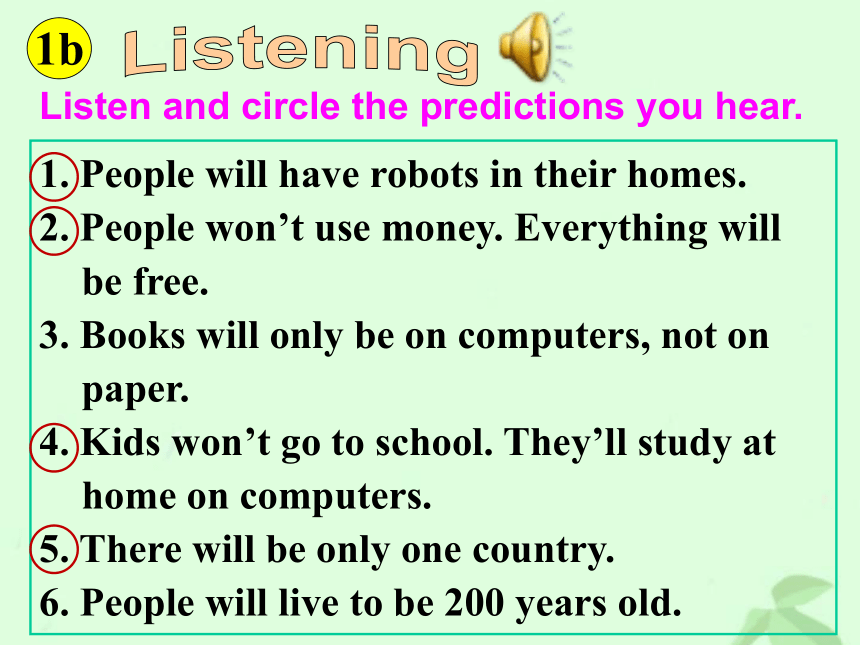
文档简介
课件22张PPT。Unit 3
Will people have robots?Section A 1a-2dI’m thirteen years old now. And I will be fifteen years old in two years.
现在我十三岁,两年后我将是十五岁。 in two yearstwo years agonow两年以后Presentation1. will + 动词原形2. won’t + 动词原形e.g. Books won’t be on paper.
e.g. Books will be on computers.
GameHow will your life be like in 100 years? Can you say any sentences?People will have robots in their homes. There will be only one country. FREEPeople won’t use money. Everything will be free. Books will only be on computers, not on paper. Kids won’t go to school. They’ll study at home on computers.People will live to be 200 years old. How will the world be different in the future, 100 years from now? Read these predictions. Check (√) A (for agree) or D (for disagree). 1a A D 1. People will have robots in their homes.
A D 2. People won’t use money. Everything will be free.
A D 3. Books will only be on computers, not on paper.
A D 4. Kids won’t go to school. They’ll study at home on computers.
A D 5. There will be only one country.
A D 6. People will live to be 200 years old.1. People will have robots in their homes.
2. People won’t use money. Everything will be free.
3. Books will only be on computers, not on paper.
4. Kids won’t go to school. They’ll study at home on computers.
5. There will be only one country.
6. People will live to be 200 years old. ListeningListen and circle the predictions you hear. 1bWill people use money in 100 years?No, they won’t. Everything will be free.1cYes, they will. Will people live to be 200 years old?Pair workWill kids go to school?No, they won’t. They’ll study at home on computers.Will there be only one country?Yes, there will be only one country. more trees more waterless meatless + 不可数名词fewer peoplefewer + 可数名词many—more—most much—more—most
few—fewer—fewest little—less—least
修饰可数名词 修饰不可数名词RememberListeningListen and circle the words you hear. 2a1. There will be (more/ less/ fewer) people.
2. There will be (more/ less /fewer) free time.
3. There will be (more/ less/ fewer) pollution.
4. There will be (more/ less/ fewer) cars.
5. There will be (more/ less/ fewer) trees. ______1. There will be fewer people.
______2. There will be less free time.
_____ 3. People will use the subways less.
_____ 4. There will be more pollution.
_____ 5. Cities will be very big and crowed. Listen again. Check (√) the predictions you hear. 2bPairworkMake conversations about the predictions in 2a and 2b. What’s your prediction about the future?I think there will be more pollution.2cReally? I don’t think so. But I think there will be fewer trees.What’s your prediction about the future?I think cities will be very big and crowed.Sure. I agree with you. And I think there will be more pollution.2d Role-play the conversation.
Nick: What are you reading, Jill?
Jill: It’s a book about the future.
Nick: Sounds cool. So what will the
future be like?
Jill: Well, cities will be more crowded and
polluted. There will be fewer trees and the
environment will be in great danger.Nick: That sounds bad! Will
we have to move to other
planets?
Jill: Maybe. But I want to live
on the earth.
Nick: Me, too. Then what can we do?
Jill: We can use less water and plant more trees.
Everyone should play a part in saving the
earth.play a part in… 是一个固定短语,表示“参与……;在……中尽自己的一份力量”e.g. He didn’t play a part in making this decision.
他并没参与做出此决定。part n. 参加;参与;部分What are you reading, Jill? …It’s a book about the future. …Role-play the conversation.Role play
Will people have robots?Section A 1a-2dI’m thirteen years old now. And I will be fifteen years old in two years.
现在我十三岁,两年后我将是十五岁。 in two yearstwo years agonow两年以后Presentation1. will + 动词原形2. won’t + 动词原形e.g. Books won’t be on paper.
e.g. Books will be on computers.
GameHow will your life be like in 100 years? Can you say any sentences?People will have robots in their homes. There will be only one country. FREEPeople won’t use money. Everything will be free. Books will only be on computers, not on paper. Kids won’t go to school. They’ll study at home on computers.People will live to be 200 years old. How will the world be different in the future, 100 years from now? Read these predictions. Check (√) A (for agree) or D (for disagree). 1a A D 1. People will have robots in their homes.
A D 2. People won’t use money. Everything will be free.
A D 3. Books will only be on computers, not on paper.
A D 4. Kids won’t go to school. They’ll study at home on computers.
A D 5. There will be only one country.
A D 6. People will live to be 200 years old.1. People will have robots in their homes.
2. People won’t use money. Everything will be free.
3. Books will only be on computers, not on paper.
4. Kids won’t go to school. They’ll study at home on computers.
5. There will be only one country.
6. People will live to be 200 years old. ListeningListen and circle the predictions you hear. 1bWill people use money in 100 years?No, they won’t. Everything will be free.1cYes, they will. Will people live to be 200 years old?Pair workWill kids go to school?No, they won’t. They’ll study at home on computers.Will there be only one country?Yes, there will be only one country. more trees more waterless meatless + 不可数名词fewer peoplefewer + 可数名词many—more—most much—more—most
few—fewer—fewest little—less—least
修饰可数名词 修饰不可数名词RememberListeningListen and circle the words you hear. 2a1. There will be (more/ less/ fewer) people.
2. There will be (more/ less /fewer) free time.
3. There will be (more/ less/ fewer) pollution.
4. There will be (more/ less/ fewer) cars.
5. There will be (more/ less/ fewer) trees. ______1. There will be fewer people.
______2. There will be less free time.
_____ 3. People will use the subways less.
_____ 4. There will be more pollution.
_____ 5. Cities will be very big and crowed. Listen again. Check (√) the predictions you hear. 2bPairworkMake conversations about the predictions in 2a and 2b. What’s your prediction about the future?I think there will be more pollution.2cReally? I don’t think so. But I think there will be fewer trees.What’s your prediction about the future?I think cities will be very big and crowed.Sure. I agree with you. And I think there will be more pollution.2d Role-play the conversation.
Nick: What are you reading, Jill?
Jill: It’s a book about the future.
Nick: Sounds cool. So what will the
future be like?
Jill: Well, cities will be more crowded and
polluted. There will be fewer trees and the
environment will be in great danger.Nick: That sounds bad! Will
we have to move to other
planets?
Jill: Maybe. But I want to live
on the earth.
Nick: Me, too. Then what can we do?
Jill: We can use less water and plant more trees.
Everyone should play a part in saving the
earth.play a part in… 是一个固定短语,表示“参与……;在……中尽自己的一份力量”e.g. He didn’t play a part in making this decision.
他并没参与做出此决定。part n. 参加;参与;部分What are you reading, Jill? …It’s a book about the future. …Role-play the conversation.Role play
同课章节目录
- Unit 1 Do you want to watch a game show?
- Section A
- Section B
- Unit 2 I'm going to study computer science.
- Section A
- Section B
- Unit 3 Will people have robots?
- Section A
- Section B
- Unit 4 How do you make a banana milk shake?
- Section A
- Section B
- Unit 5 Can you come to my party?
- Section A
- Section B
- Unit 6 If you go to the party, you'll have a great
- Section A
- Section B
- Unit 7 What's the matter?
- Section A
- Section B
- Unit 8 I'll help to clean up the city parks.
- Section A
- Section B
